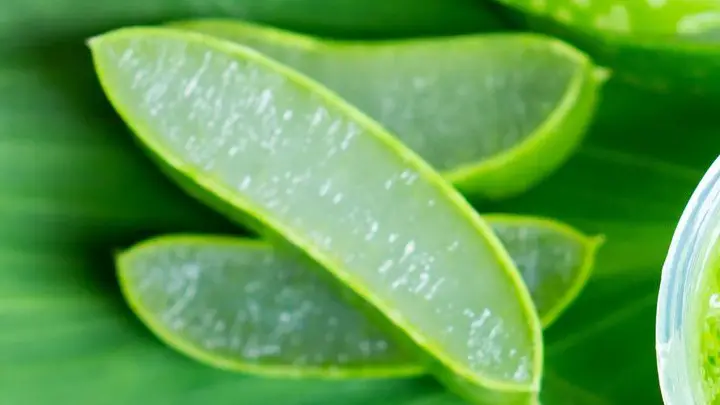Aloe vera is a household plant that is popular for its wound healing and soothing properties. Using aloe vera is good for your skin especially if you are experiencing skin irritation and inflammation like acne.
Applying aloe vera regularly will help to treat various skin concerns like acne, eczema, sunburn, and so on. You can get yourself an aloe gel or you can use a freshly scooped gel from an aloe plant.
Read ahead to find out if aloe vera can help with your skin concerns and how to use it effectively on your skin.
Is Aloe Vera Good for Skin Rash?
Skin irritation and rashes may occur due to allergic reactions such as swelling and redness. Using aloe gel on your skin is good for skin rashes as it can help to soothe mild-to-moderate rashes.
Aloe gel is popular for its ability to heal wounds and soothe inflammation. While you can get an over-the-counter aloe gel for this purpose, you can also use pure aloe gel by scooping out the transparent gel of an aloe plant.
However, you need to be careful while using aloe gel as a remedy for a skin rash as it is capable of making your rashes worse. It is best to consult a doctor on the risks before attempting to use aloe gel as a treatment for skin rashes.
Is Aloe Vera Good for Skin Cancer?
No, using aloe vera is not a good idea for skin cancer as it can cause severe side effects. Moreover, there is no scientific research or evidence to support claims of aloe vera’s effectiveness in treating cancer.
You can use aloe vera to treat other minor skin concerns, like burns. You may also use aloe gel on your skin during radiotherapy treatment, as it can help to soothe burns caused by the treatment.
SEE: Drinking Aloe Vera Benefits Your Body. Find Out How
Is Aloe Vera Good for Skin Tightening?
Applying aloe vera gel on the skin is good for tightening the skin, as it helps to increase collagen and elastin production in the skin.
Elastin is a protein fiber produced in the body to strengthen the connective tissues of the skin. That boosts the skin’s elasticity by giving it a tightening effect to make it firm and flexible.
Is Aloe Vera Good for Skin Hydration?
Aloe vera is good for retaining the skin’s hydration as it works as a humectant. The humectant properties of aloe gel give it the ability to keep moisture in the skin.
It draws moisture from the environment and the body to ensure that the skin remains moisturized.
Is Aloe Vera Good for Skin Infections?
Aloe gel contains antimicrobial, anti-inflammatory, and antibacterial properties, and that makes it good for skin infections. The antiseptic properties of aloe vera make it effective for treating and protecting the skin from bacterial infections.
Aloe also works as an astringent to dry out inflammation and reduce redness on the skin. Applying aloe gel on your skin will also help to soothe the redness, irritation, and other symptoms that come with the infections.
SEE: Aloe Vera Hair Benefits: Find Out Why It Is Great for Your Hair and Scalp
Is Aloe Vera Good for Skin Tags?
One of the best remedies for treating skin disorders effectively is aloe vera. Applying aloe gel on your skin is good for skin tags. Simply apply aloe gel, juice, or place an aloe plant on the affected area of your skin.
You can allow it to sit on your skin overnight and rinse it off the next morning with clean water. Keep doing this every day until the tags fade or fall off.
Is Aloe Vera Good for Skin During Pregnancy?
Applying aloe vera on the skin is good during pregnancy as it can help to reduce stretch marks and itchy skin around the stomach. Apply an aloe gel on your skin to treat skin concerns even as you are pregnant.
However, you should refrain from drinking aloe gel while pregnant. This is because aloe contains anthraquinone and latex, and they can cause an unusual heartbeat rate.
This will result in abdominal pains and it can also affect the fetus. It can also cause uterine contractions, which can be very dangerous for pregnant women.
Is Aloe Vera Good for Sensitive Skin?
Aloe vera is good for sensitive skin as it contains healing properties that can help to relieve skin irritation. The gel contains anti-inflammatory properties that help to soothe redness, infection, itchiness, and other forms of allergic reactions.
However, you shouldn’t use aloe vera on your skin without carrying out a patch test. Check if your sensitive skin is not allergic to aloe gel, as this will help you avoid worse side effects after using aloe gel.
SEE: Is Aloe Vera Good for Acne? Get Your Answers Here
How to Use Aloe Vera for Skin Problems
Buy an aloe vera gel in a store, but ensure that you avoid one that contains chemicals and alcohol, as they are harmful to the skin. Meanwhile, you can also use fresh aloe gel from an aloe plant.
Use a sharp knife to cut a leaf off an aloe plant and rinse it with clean water. After rinsing, pat the leaf dry with a clean cloth. Drain the latex by placing the leaf in a bowl for about 15 minutes before cutting the sides of the leaf to scoop out the gel.
Scoop out the gel into a container with a spoon. Store it in your refrigerator to extend the lifespan to up to 2 weeks. Once you have your gel ready, do a patch test to see how your skin will react to the treatment.
Wait for 24 hours after applying the gel to your skin to check for a reaction. If you experience allergic contact dermatitis symptoms like rashes and redness, don’t continue using the gel. If you do not experience any irritation, you can continue using the gel on your skin.
Below are ways in which you can use aloe gel on your skin.
Use as face wash
Wash your hands and use your fingertips to take out a small amount of gel. Apply the gel on your face in a circular motion and ensure that you cover every area of your face. Rinse your face with clean water and pat it dry with a towel.
Use as skin toner
Mix aloe vera gel and water into a container to make a toner. Shake the container well and use cotton balls to take out some to apply on your face.
Use as insect bite treatment
Wash the problem areas with soap and water. Dry it with a towel and apply your aloe gel for about 15 to 20 minutes. Reapply as much as you need to.
Use for minor skin wounds or cuts
Cleanse the affected area with soap and water and allow it to dry. Use your fingertips to apply a little amount of aloe gel to the cut. Use a bandage to cover the area and allow it to work overnight. You can try the process again the next day if you need to.
Use for acne spots and rosacea
Create a mixture with a tablespoon of aloe vera gel and 3 drops of fresh lemon juice. Apply the solution to the problem areas of your skin after cleansing it. You can do this twice a day to achieve maximum results.
Use for sunburn
Apply frozen aloe gel on the problem area two to three times daily. Do this till your skin returns to normal with less inflammation.
Frequently Asked Questions
Is aloe vera good for your face every day?
Yes, it is. Applying aloe vera on your face every day is good for moisturizing and clearing off skin blemishes.
Aloe gel contains properties that will help to reduce inflammation, swelling, and itchiness. It also has healing properties that can help to treat skin rashes and other skin infections.
Is aloe vera good for over-exfoliated skin?
Yes, it is. Aloe gel helps to treat over-exfoliated skin with its anti-inflammatory properties. The moisturizing properties of the gel will help hydrate and repair the skin. Aloe gel will help to balance your skin barrier while allowing your skin to repair itself.
Is aloe vera good for acne?
Yes, it is. Using aloe vera for acne is a good way to prevent and reduce acne inflammation on the skin. Aloe gel contains antibacterial properties that can help to kill acne-causing bacteria.
It also contains anti-inflammatory properties that will help to relieve and soothe acne inflammation and redness. While the antiseptic effect of aloe gel will help to dry out the excess oil that can cause acne in the skin.
Conclusion
Aloe vera contains several beneficial properties that make it suitable for all. The moisturizing properties will help to hydrate and keep hydration in the skin.
The anti-inflammatory properties of aloe gel make it an ideal treatment for sensitive skin as it will help to soothe irritation, itchiness, redness, and dryness. The antibacterial properties of the gel work to reduce the formation of acne in the skin by fighting acne-causing bacteria.
Thanks for reading.
Visit Africana Fashion for more enlightening skincare guides.






